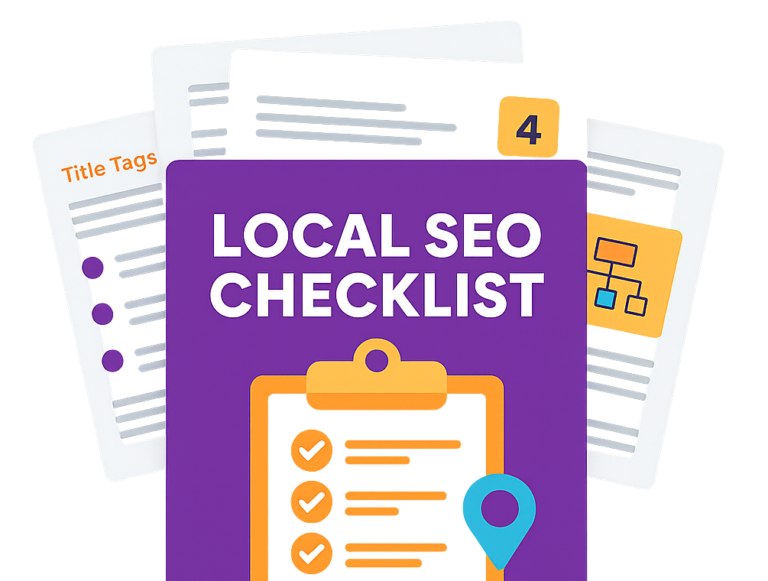In a crowded market, simply having a website is no longer enough to capture the attention of local customers. To truly stand out in your community, whether you're based in Cambridgeshire or Cardiff, you must connect with your audience on a local level through strategic content. This requires a focused approach that goes beyond generic search engine optimisation (SEO) and builds a genuine local presence. For a broader overview of foundational strategies, this comprehensive digital marketing guide for entrepreneurs provides a solid starting point.
However, dominating local search results demands a more specialised toolkit. This article moves beyond the basics to deliver eight powerful and practical content marketing strategies for local SEO, specifically designed for UK businesses. We will explore actionable steps you can implement immediately to build community trust, enhance your visibility in local map packs, and convert nearby searchers into loyal customers.
From creating location-specific content and leveraging your Google Business Profile to sharing customer success stories and collaborating with neighbouring businesses, you'll learn exactly how to make your brand the local authority. Let’s dive into the proven tactics that will transform your content into your most valuable local marketing asset.
1. Location-Based Content Creation: Becoming a Community Hub
One of the most effective content marketing strategies for local SEO is to transform your business website from a simple digital brochure into a valuable community resource. This involves creating content that is deeply rooted in your local area, addressing the specific interests, needs, and events of the community you serve. By producing content that resonates with residents, you attract a highly relevant local audience and signal to search engines like Google that your business is a prominent local entity.
This approach goes beyond just mentioning your town or city. It’s about demonstrating genuine local expertise and involvement. For a business in Cambridgeshire, this could mean writing a guide to the best local business networking events or creating a family-friendly guide to the annual Midsummer Fair. The goal is to become the go-to source for local information related to your industry.
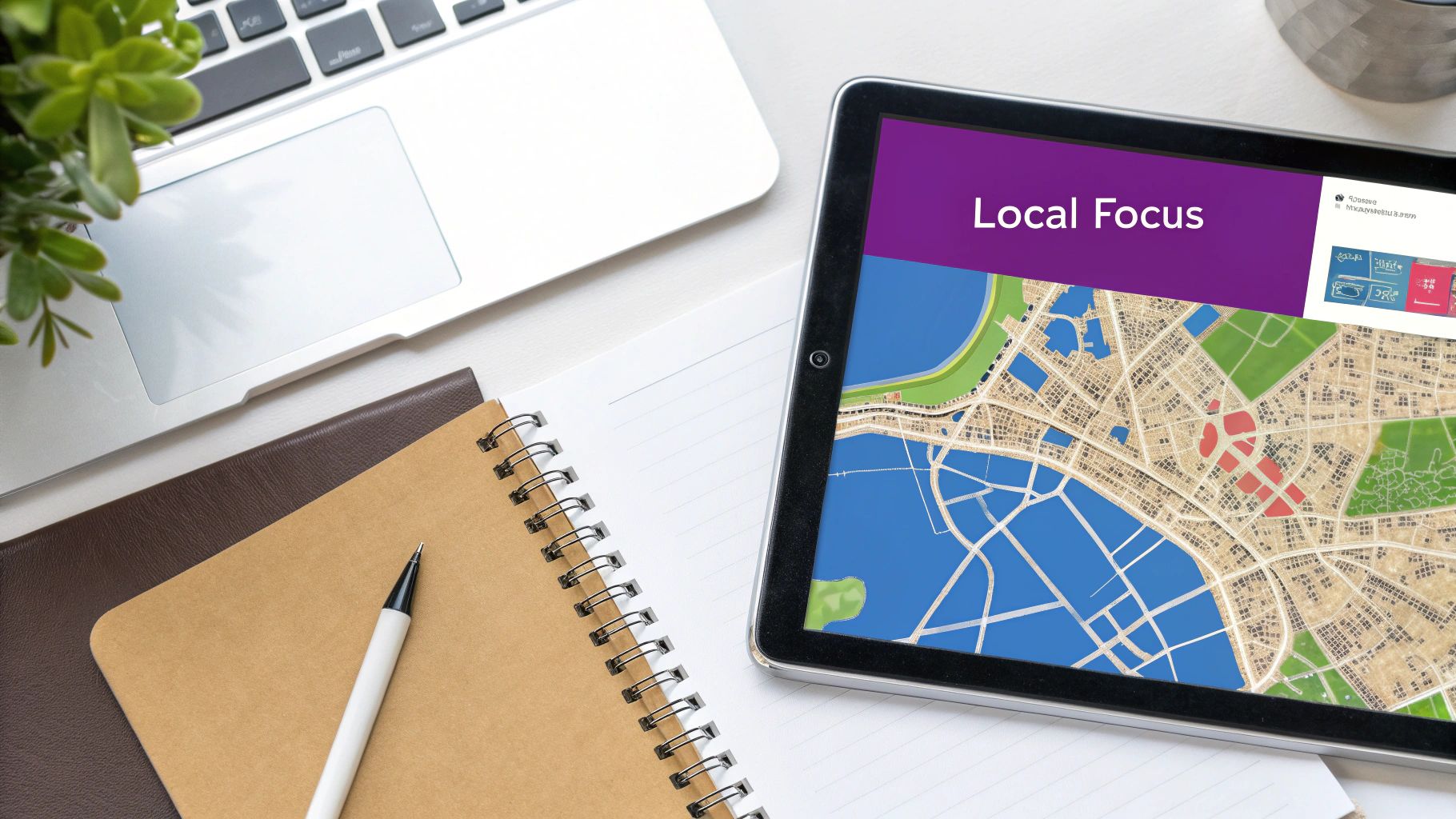
Why This Strategy Works
This strategy is powerful because it directly targets users searching for local solutions and information. When a Manchester estate agent publishes detailed neighbourhood guides, they attract potential homebuyers researching specific postcodes. Similarly, an Edinburgh fitness studio creating content about local park runs can capture the attention of local fitness enthusiasts. This content naturally incorporates local keywords and landmarks, strengthening your geographical relevance for search engines.
How to Implement It
- Research Local Keywords: Use SEO tools to identify what local people are searching for. Look for queries like "best coffee shops in [your neighbourhood]" or "things to do in [your town] this weekend."
- Create Neighbourhood Guides: Develop in-depth profiles of the areas you serve, highlighting local amenities, schools, transport links, and unique characteristics.
- Cover Local Events: Write blog posts before, during, and after local festivals, markets, or community gatherings. Create event calendars relevant to your audience.
- Partner with Locals: Collaborate with other non-competing local businesses or community influencers on content projects to cross-promote and build local authority. For more insights on building a strong foundation, review these content marketing best practices.
2. Google Business Profile Optimisation with Content
Treating your Google Business Profile (GBP) as a dynamic content platform rather than a static listing is one of the most impactful content marketing strategies for local SEO. This involves regularly sharing updates, offers, events, and other engaging content directly on your profile. By doing so, you transform your GBP from a simple directory entry into a mini-website and social media channel combined, signalling to Google that your business is active, relevant, and engaged with its local community.
This strategy capitalises on prime search real estate, as your GBP content appears directly in Google Search and Maps results. For an auto repair shop, this could mean posting seasonal maintenance tips; for a local gym, it might be sharing workout videos and class schedules. The goal is to provide timely, valuable information that captures a searcher's attention at the moment they are looking for local services, significantly boosting visibility and customer engagement.
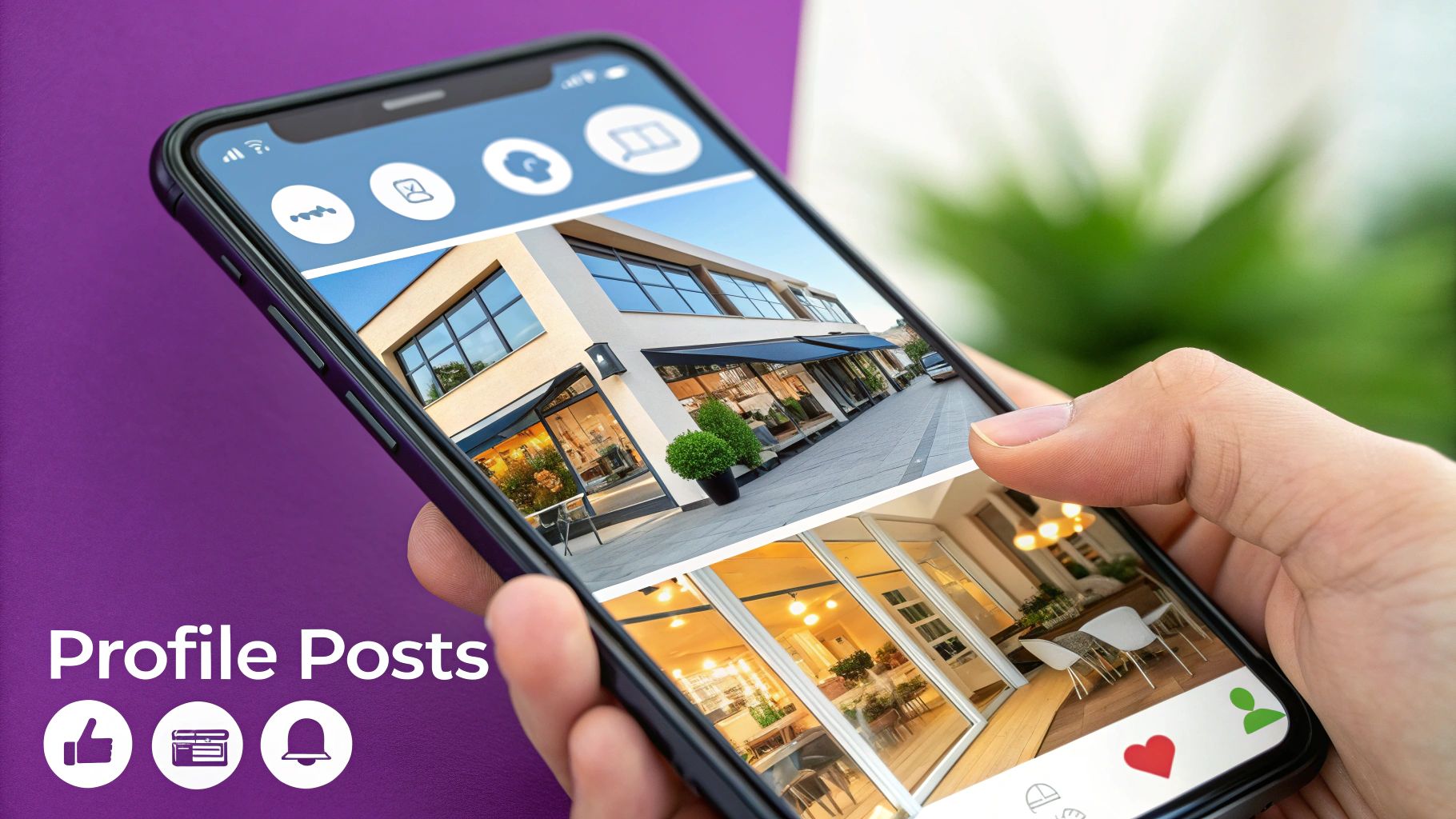
Why This Strategy Works
This approach is highly effective because it directly influences your appearance in the local pack and on Google Maps, which are critical touchpoints for local customers. Consistent activity on your GBP, such as regular posts and prompt review responses, are strong ranking signals for Google's local algorithm. When a Starbucks in Cambridge posts its daily specials, it not only informs potential customers but also shows Google that the listing is actively managed and up-to-date, which can lead to higher rankings over less active competitors.
How to Implement It
- Post Consistently: Aim to add GBP posts at least 3-4 times per week. Use the 'Update', 'Offer', and 'Event' post types to keep your content varied and timely.
- Use High-Quality Visuals: Include original, high-quality photos and videos in every post. Showcase your products, services, team, or premises to build trust.
- Incorporate Local Keywords: Naturally weave location-specific keywords and phrases into your post descriptions to reinforce your geographical relevance.
- Encourage and Respond to Reviews: Actively ask for reviews and respond to every single one, both positive and negative, to demonstrate excellent customer service. For a deeper dive into this, see these expert insights on Google Business Profile optimisation.
3. Hyperlocal Keyword Targeting
Moving beyond broad city-level terms, hyperlocal keyword targeting is a content marketing strategy that zooms in on extremely specific, geographically-focused keywords. This involves creating content around individual neighbourhoods, specific streets, well-known landmarks, and even local slang or terminology. The objective is to attract a micro-audience that is actively searching for services within a very precise area, capturing highly qualified local traffic with significantly less competition.
This granular approach signals to search engines that you are not just in a city, but are an integral part of its distinct communities. For a plumbing service in Cambridge, this means moving beyond "plumber in Cambridge" to create content targeting "emergency plumber near Mill Road" or "boiler repair in Chesterton." This precision ensures you appear for searches made by people who are often ready to make a purchase or enquiry.
Why This Strategy Works
Hyperlocal targeting is powerful because it matches user intent with pinpoint accuracy. A user searching for "best coffee near King's College" has a much higher intent to visit than someone searching for "Cambridge coffee shops." By creating content that serves these niche queries, you connect with potential customers at the exact moment they need you. This method naturally reduces competition, making it easier for smaller businesses to rank prominently for valuable, purchase-ready search terms.
How to Implement It
- Create Location-Specific Landing Pages: Develop dedicated pages on your website for each key neighbourhood or area you serve. These pages should detail your services and feature hyperlocal keywords and landmarks.
- Research Local Terminology: Use local forums, community Facebook groups, and Google's Keyword Planner to discover how residents refer to their areas. Uncover colloquialisms that don't appear in standard keyword research.
- Optimise for "Near Me" Searches: Structure your content to naturally include phrases like "near me" or "close by." This can be done by mentioning local landmarks, e.g., "accountants near Cambridge railway station."
- Analyse Competitor Keywords: Investigate which hyperlocal terms your direct competitors are ranking for and identify opportunities they may have missed. Dive deeper with these 10 local SEO tips for Cambridgeshire businesses to gain a competitive edge.
4. Local Customer Success Stories and Case Studies
One of the most potent content marketing strategies for local SEO is showcasing the real-world success of your local customers. By creating detailed case studies or success stories, you transform satisfied clients into powerful marketing assets. This approach builds immense trust and social proof, demonstrating your value through tangible results achieved for people and businesses within your community.
This strategy involves more than just a brief testimonial; it's about telling a complete story. For an HVAC company in Bristol, this could be a detailed account of a complex boiler installation in a specific neighbourhood, complete with photos and quotes from the homeowner. The objective is to provide authentic, relatable proof of your expertise, which resonates deeply with prospective local customers facing similar challenges.

Why This Strategy Works
This strategy is highly effective because it directly addresses the primary concern of potential customers: "Can this business solve my problem?" A well-crafted case study answers this question with a definitive "yes," backed by evidence. For a Cambridge marketing agency, showcasing how they helped a local restaurant increase bookings organically incorporates local business names and challenges, naturally boosting geographical SEO signals. These stories are rich with specific, long-tail keywords (e.g., "emergency plumbing repair in Milton Road") that attract highly qualified local traffic.
How to Implement It
- Identify Ideal Candidates: Reach out to your happiest and most successful customers. Choose clients whose stories are relatable to your target audience.
- Structure the Narrative: Frame the story around the customer's problem, the solution you provided, and the specific, measurable results they achieved.
- Incorporate Local Details: Mention the customer's town, neighbourhood, or even specific landmarks to reinforce local relevance for search engines and readers.
- Use Rich Media: Include high-quality photos or, even better, video testimonials. Visual proof adds a powerful layer of authenticity and engagement.
5. Community Event Coverage and Local News
Another powerful content marketing strategy for local SEO involves embedding your business within the fabric of your community by covering local news and events. This turns your website into a timely, relevant information source for what’s happening on the ground. By actively participating in and documenting local happenings, you demonstrate that your business is an engaged community member, not just a commercial entity.
This strategy is about becoming a local reporter for your niche. For a bookshop in York, this could mean blogging about the York Literature Festival or interviewing local authors. For a restaurant in Bristol, it might involve covering the Bristol Harbour Festival or creating a guide to the best stalls at the local farmers' market. The aim is to create content that captures the pulse of your local area, attracting an audience interested in community life.
Why This Strategy Works
This approach capitalises on the high search interest surrounding local events and news. When people search for "Cambridge Christmas market dates" or "charity fun runs near me," your content can be the first they see. This positions your brand as a helpful, authoritative local resource and naturally integrates location-specific keywords and names into your site, boosting your geographical relevance to search engines and building goodwill within the community.
How to Implement It
- Create a Local Event Calendar: Maintain an up-to-date calendar on your website featuring events relevant to your audience, from community fêtes to industry-specific conferences.
- Partner with Organisers: Reach out to event organisers for early access, interviews, or co-promotional opportunities. To effectively spread the word, consider distributing custom flyers in the local area.
- Produce Recap Content: After an event, publish a blog post or video with photos, highlights, and quotes from attendees. This creates valuable content for those who couldn't attend.
- Utilise Live Social Media: During the event, use Instagram Stories, Facebook Live, or X (formerly Twitter) to share real-time updates, engaging your audience in the moment and driving traffic back to your website.
6. Local Business Collaboration and Cross-Promotion
One of the most powerful content marketing strategies for local SEO involves teaming up with other businesses in your community. This strategy centres on creating content partnerships to expand your reach, share audiences, and build authentic local connections. By collaborating with complementary, non-competing businesses, you can create high-value content that serves a broader local audience and sends strong local relevance signals to search engines.
This approach is about community over competition. It demonstrates that your business is an active and integrated part of the local commercial ecosystem. For instance, a wedding venue in Cambridgeshire could partner with local photographers, florists, and caterers to create a comprehensive "Ultimate Guide to Planning a Cambridge Wedding." This shared content provides immense value to the target audience while cross-promoting all involved businesses. The goal is to leverage collective strength for mutual benefit.
Why This Strategy Works
Collaborative content amplifies your marketing efforts without a significant increase in budget. When you partner with another local business, you gain access to their established audience, enhancing brand visibility and driving referral traffic. For search engines, these partnerships create a web of local citations, backlinks, and co-mentions that reinforce your geographical authority. A local fitness studio collaborating with a nutritionist on a wellness blog series, for example, creates valuable, authoritative content that benefits both their SEO profiles.
How to Implement It
- Identify Complementary Partners: Look for non-competing businesses that share a similar target audience. Think about the customer journey and who else your clients might do business with.
- Develop Joint Content: Co-create valuable resources such as blog posts, guides, webinars, or even local events. Ensure each partner contributes their unique expertise.
- Organise Mutual Promotion: Agree on a promotional schedule. Share the content on all partners' social media channels, email newsletters, and websites, linking back to each other.
- Establish Clear Guidelines: Before starting, create a simple partnership agreement outlining content ownership, promotional responsibilities, and how you will track success. For guidance on structuring your wider efforts, consider these established B2B content marketing strategies.
7. Localised Industry Expertise and Educational Content
Demonstrating general industry knowledge is good, but showcasing expertise tailored to your specific locality is one of the most powerful content marketing strategies for local SEO. This involves creating educational content that addresses industry topics through a local lens, considering regional regulations, climate, culture, and market conditions unique to your area. This approach positions your business not just as an expert, but as the go-to local authority.
This strategy goes beyond generic advice. It’s about providing hyper-relevant, practical guidance that national competitors cannot replicate. For a Cambridgeshire financial advisor, this could mean writing a guide on local council tax nuances or investment opportunities in the region’s booming tech sector. The aim is to answer the specific questions and solve the unique problems your local customers face, building immense trust and credibility.
Why This Strategy Works
This strategy is effective because it directly addresses the sophisticated needs of a local audience, signalling unparalleled relevance to search engines. When a roofer in Manchester writes a detailed blog post on dealing with the effects of persistent local rainfall on slate roofs, they attract highly qualified leads searching for specific solutions. Similarly, a Bristol-based solicitor creating content on navigating local planning permissions for property extensions will capture an audience with high purchase intent. This content naturally integrates local terminology and addresses area-specific concerns, solidifying your geographical authority.
How to Implement It
- Address Local Regulations: Create content explaining how local or county-level laws, building codes, or business regulations affect your customers.
- Develop Local Case Studies: Showcase your work with local clients, detailing the specific challenges and solutions relevant to the area.
- Create Seasonal Guides: Write guides that tie your services to local seasons or climate. For example, a Cambridge landscaper could create a guide to "Preparing Your Garden for the Fenland Winter."
- Interview Local Experts: Collaborate with other local professionals, such as council members or non-competing business owners, to create authoritative content like interviews or Q&A articles.
8. Local Schema Markup and Structured Data Content
While much of content marketing focuses on the words and visuals your audience sees, a powerful technical strategy involves communicating directly with search engines. Implementing local schema markup, also known as structured data, is a way of translating your website's content into a language that search engines like Google can instantly understand. This technical approach enhances your existing content, making it eligible for rich, informative search results.
This strategy essentially adds a layer of code to your website that explicitly labels key information, such as your business name, address, phone number, opening hours, and customer reviews. For a Cambridge-based restaurant, this could mean marking up its menu so Google can display specific dishes and prices directly in search results. The goal is to make it as easy as possible for search engines to categorise and present your crucial local business information to potential customers.
Why This Strategy Works
This is one of the most direct content marketing strategies for local SEO because it directly influences how your business appears in the Search Engine Results Pages (SERPs). By providing clear, structured data, you increase your chances of appearing in the Local Pack, knowledge panels, and other visually enhanced results known as rich snippets. A local medical practice using schema for its services and FAQs can answer a user's query directly within the search results, establishing immediate authority and improving click-through rates.
How to Implement It
- Start with LocalBusiness Schema: This is the foundational markup for any local enterprise. Ensure it includes your correct name, address, phone number (NAP), and opening hours.
- Use Specific Schema Types: Explore more detailed schema relevant to your business. A retailer could use
Productschema to show stock availability, while a service provider might useServiceschema to detail its offerings. - Mark Up Your Content: Apply
Reviewschema to customer testimonials,Eventschema to community event pages, andFAQPageschema to your frequently asked questions content. - Validate and Monitor: Regularly use Google's Rich Results Test tool to check for errors in your implementation. Monitor your performance in Google Search Console to see which rich snippets are being displayed for your pages. For a deeper dive into this technical element, you can learn more about why schema markup is important for SEO.
Local SEO Content Strategies Comparison
| Strategy | Implementation Complexity | Resource Requirements | Expected Outcomes | Ideal Use Cases | Key Advantages |
|---|---|---|---|---|---|
| Location-Based Content Creation | Moderate – requires local research and updates | Content creators with local knowledge | Improved local SEO, community trust | Local businesses targeting neighbourhood audiences | Low competition, builds local authority |
| Google Business Profile Optimisation | Low to Moderate – consistent posting needed | Time for regular updates and media creation | Higher local visibility, direct customer engagement | Businesses with active physical locations | Free platform, real-time engagement, analytics |
| Hyperlocal Keyword Targeting | Moderate to High – detailed keyword research | SEO tools and local knowledge | Targeted traffic with high conversion potential | Small businesses focusing on micro-locations | Low competition keywords, cost-effective |
| Local Customer Success Stories & Case Studies | Moderate – requires customer coordination | Time for interviews, permissions, and production | Strong social proof and trust | Service businesses with notable local clients | High credibility, naturally includes local keywords |
| Community Event Coverage & Local News | High – timely, on-site content creation | Staff presence at events, media production | Fresh content, community engagement | Businesses involved in local events | Timeliness, link-building, community relationships |
| Local Business Collaboration & Cross-Promotion | Moderate – needs coordination and partnership | Collaboration management and joint efforts | Expanded reach, shared audiences | Local businesses seeking partnerships | Shared costs, network building, natural link earning |
| Localised Industry Expertise & Educational Content | High – requires deep local expertise | Research, expert input, potential legal review | Thought leadership, qualified lead generation | Professional services adapting to local market | Builds authority, addresses unique local needs |
| Local Schema Markup and Structured Data Content | High – technical implementation needed | Developer time, ongoing maintenance | Enhanced search listings, better search understanding | Businesses with websites and SEO focus | Improved CTR, rich snippets, voice search readiness |
Putting Your Local Content Strategy into Action
The journey to dominating local search results is a marathon, not a sprint. We've explored a powerful arsenal of content marketing strategies for local SEO, moving from the foundational optimisation of your Google Business Profile to the nuanced application of Local Schema markup. The common thread weaving through each tactic is a commitment to genuine local relevance and community engagement.
Your path forward is not about flawlessly executing every single strategy at once. Instead, it's about building a consistent, layered approach. Start with the essentials: anchor your presence with a perfectly optimised Google Business Profile and begin targeting hyperlocal keywords that your ideal customers are actively searching for. From there, you can layer in more dynamic content.
Key Takeaways for Immediate Implementation
To synthesise the insights from this guide, focus on these core principles:
- Authenticity is Non-Negotiable: Whether you're writing a customer success story or covering a community event, your content must be genuine. Local audiences can spot inauthentic marketing from a mile away; your goal is to become a trusted, recognisable part of the local fabric.
- Relevance Drives Rankings: Search engines are relentlessly focused on user intent. Creating content that directly answers local questions, highlights nearby landmarks, or features familiar faces sends powerful signals to Google that you are the most relevant result for a local searcher.
- Consistency Builds Momentum: A single blog post or a one-off collaboration will have a limited impact. The true power of these content marketing strategies for local SEO is realised through consistent application over time, building a rich portfolio of locally-focused assets that compound in value.
Your Actionable Next Steps
Feeling energised? Good. Now, channel that motivation into concrete actions. Begin by conducting a simple audit of your current digital footprint. Is your Google Business Profile complete and rich with posts? Are your service pages speaking directly to the neighbourhoods you serve?
Next, pick one or two strategies from this list that feel most achievable for your business right now. Perhaps it's reaching out to a complementary local business for a cross-promotional blog post or interviewing a loyal customer for a compelling case study. The key is to start small, build a repeatable process, and then expand your efforts.
Mastering these strategies will transform your business from being merely present online to becoming a pillar of the local digital community. This deep-rooted connection not only drives immediate footfall and enquiries but also builds long-term brand loyalty and resilience. As search landscapes evolve, staying informed about innovative new SEO traffic strategies like Perplexity SEO is crucial to continuously drive engaged customers to your local business. By embedding your brand into the heart of your community, you create a sustainable competitive advantage that national chains simply cannot replicate.
Ready to turn these strategies into tangible growth for your business in Cambridgeshire and beyond? The team at Bare Digital specialises in creating bespoke local SEO and content plans that get results. Visit Bare Digital to book your free SEO Health Check and receive a clear, actionable plan to connect with more local customers.


